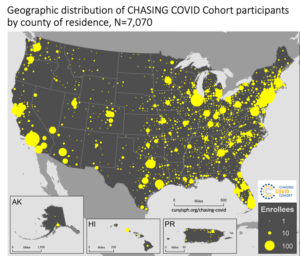The CHASING COVID Cohort study began enrolling participants on March 28, 2020 and ended enrollment on August 21, 2020, with 6,753 participants from across the United States, including Puerto Rico and Guam.
The cohort represents a geographically and socio-demographically diverse sample of the adult US population: 15% of participants were 60 years or older at enrollment, 33% are Black or Hispanic, and 45% are men. At least 15% of participants are frontline workers, either in healthcare or other essential employees such as police, first responders, people in food services or transportation.
COVID-like symptom reporting at baseline
Overall, 17% of respondents reported COVID-like symptoms within the past month such as cough, fever or shortness of breath. This proportion varied with age, however: among participants 18-49 years of age, 19% reported COVID-like symptoms, dropping to 15% among participants 50-59, and 11% among participants 60 years and older.
At-risk respondents
More than half of respondents reported having risk factors—such as age, underlying health conditions (e.g., chronic lung disease), or daily smoking—that put them at higher risk for severe COVID-19 illness should they become infected with SARS-CoV-2.
Infection control practices at baseline
In the baseline survey from early April, a high proportion of study participants reported taking actions that reduce SARS-CoV-2 spread. Ninety-three percent reported avoiding groups of greater than 20 people, 58% wore masks, and 73% self-quarantined.
Month-1 Follow-up
We have started inviting participants to complete the month-1 follow-up assessment. Participants replying to the month-1 survey will also be mailed an at-home dried blood spot (DBS) specimen collection kit, to be used for antibody testing once we have secured funding and a validated test is available for DBS. We plan to offer serology testing at the three-month follow-up as well, which will allow us to identify risk factors for new infections in the cohort.
If you are a participant and have not yet received an email about completing your month-1 follow up assessment and at home specimen collection, please email us at [email protected].
Related publications
“A national prospective cohort study of SARS/COV2 pandemic outcomes in the U.S.: The CHASING COVID Cohort,” McKaylee Robertson, Sarah Kulkarni, Amanda Berry, Chloe Mirzayi, Andrew R Maroko, Rebecca Zimba, Drew Westmoreland, Christian Grov, Angela Parcesepe, Levi Waldron, Denis Nash, [Preprint] medRxiv 2020 doi: https://doi.org/10.1101/2020.04.28.20080630
Click here to receive study updates from the C3 team.
The C3 team is actively applying for research funding from the NIH and other sources to support this work. If you would like to help support this work in the meantime, please follow this link.
About the Institute for Implementation Science in Population Health at the City University of New York
The CUNY Institute for Implementation Science in Population Health (ISPH) was founded on the notion that substantial improvements in population health can be efficiently achieved through better implementation of existing strategies, policies, and interventions across multiple sectors. We study how to translate and scale-up evidence-based interventions and policies within clinical and community settings in order to improve population health and reduce health disparities. CUNY ISPH. Pursing population health gains through better implementation. www.cunyisph.org. Follow us on Twitter: @CUNYISPH.
